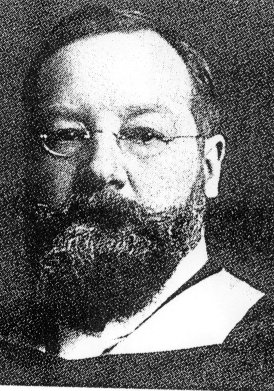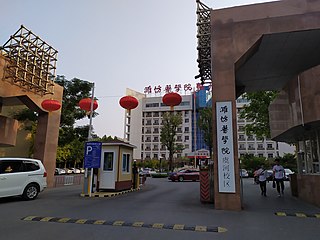Related Research Articles

Edward Bradford Titchener was an English psychologist who studied under Wilhelm Wundt for several years. Titchener is best known for creating his version of psychology that described the structure of the mind: structuralism. After becoming a professor at Cornell University, he created the largest doctoral program at that time in the United States. His first graduate student, Margaret Floy Washburn, became the first woman to be granted a PhD in psychology (1894).

The Temerty Faculty of Medicine is the medical school of the University of Toronto. Founded in 1843, the faculty is based in Downtown Toronto and is one of Canada's oldest institutions of medical studies, being known for the discovery of insulin, stem cells and the site of the first single and double lung transplants in the world.
Chifeng University (赤峰学院) is a public university formed by the combination of Chifeng Normal College of Nationalities and other four academies. It was approved by the Ministry of Education of the People's Republic of China in 2003. It is in the city of Chifeng, the birthplace of the Hong Shan cultures. The university has 24 colleges or departments

In the United Kingdom, medical school generally refers to a department within a university which is involved in the education of future medical practitioners. All leading British medical schools are state-funded and their core purpose is to train doctors on behalf of the National Health Service. Courses generally last four to six years: two years of pre-clinical training in an academic environment and two to three years clinical training at a teaching hospital and in community settings. Medical schools and teaching hospitals are closely integrated. The course of study is extended to six years if an intercalated degree is taken in a related subject.
Aberdeen University School of Medicine, Medical Sciences & Nutrition contains the Medical School and Dental School at the University of Aberdeen in Scotland. It also provides training and carries out research in medical sciences, nutrition, public health, dentistry, health sciences, physician associate studies at BSc, MSc, and PhD levels. The current school was formed from the merger of the former School of Medicine & Dentistry, School of Medical Sciences, and the Rowett Institute of Nutrition.
Chiropractic education trains students in chiropractic. The entry criteria, structure, teaching methodology and nature of chiropractic programs offered at chiropractic schools vary considerably around the world. Students are trained in academic areas including scopes of practice, neurology, radiology, microbiology, psychology, ethics, biology, gross anatomy, biochemistry, spinal anatomy and more. Prospective students are also usually trained in clinical nutrition, public health, pediatrics and other health or wellness related areas.

The Oxford University Science Area in Oxford, England, is where most of the science departments at the University of Oxford are located.

Beijing Sport University (BSU) is a public university located in Beijing, China. It is a member of the National Key Universities and the Double First Class University Plan. The university is under direct leadership of the General Administration of Sport of China. In 2015, Beijing Sport University was ranked as an "elite university" with 6-star status by the CUAA.
Nelson & Colne College is situated in the town of Nelson, Lancashire, North West of England, providing Further Education to Pendle and the surrounding districts. It is a tertiary college, offering courses to post-16 students, adult learners and those in employment looking to gain new or additional qualifications.
The University of Edinburgh Medical School is the medical school of the University of Edinburgh in Scotland and the United Kingdom and part of the College of Medicine and Veterinary Medicine. It was established in 1726, during the Scottish Enlightenment, making it the oldest medical school in the United Kingdom and the oldest medical school in the English-speaking world.
The School of Biological Sciences is a School within the Faculty Biology, Medicine and Health at The University of Manchester. Biology at University of Manchester and its precursor institutions has gone through a number of reorganizations, the latest of which was the change from a Faculty of Life Sciences to the current School.
The Sir William Dunn School of Pathology is a department within the University of Oxford. Its research programme includes the cellular and molecular biology of pathogens, the immune response, cancer and cardiovascular disease. It teaches undergraduate and graduate courses in the medical sciences.

William Dobinson Halliburton FRS was a British physiologist, noted for being one of the founders of the science of biochemistry.

Weifang Medical University is a medical university based in Weifang, Shandong province, in China.
A Bachelor of Medical Sciences (BMedSci, BMedSc, BSc(Med), BMSc) is an undergraduate academic degree involving study of a variety of disciplines related to human health leading to an in depth understanding of human biology and associated research skills such as study design, statistics and laboratory techniques. Such disciplines include biochemistry, cell biology, physiology, pharmacology or psychosocial aspects of health. It is an equivalent level qualification to the more commonly awarded Bachelor of Science (BSc). Graduates may enter a diverse range of roles including post-graduate study, higher education, the biotechnology industry, the pharmaceutical industry, consultancy roles, scientific communication, education or unrelated disciplines which make use of the broad range of transferable skills gained through this degree.

Redeemer's University is a private university in Ede, Osun, off Ibadan-Osogbo Road, Osun State, Nigeria. Established in 2005, the university is owned by the Redeemed Christian Church of God.
Several universities have designed interdisciplinary courses with a focus on human biology at the undergraduate level. There is a wide variation in emphasis ranging from business, social studies, public policy, healthcare and pharmaceutical research.
The Health Sciences University Foundation is a private educational and health care university founded in 1976. It has two locations: the main hospital and one in the University Children's Hospital, San José, Bogotá, Colombia. It offers seven undergraduate programs: Business Administration, Nursing, Surgical technologist, Medicine, Psychology with clinical emphasis, Emergency medical technician (EMT) and Cytology.
The University of Ghana Medical School also UGMS is the medical school of Ghana's first public research institution, the University of Ghana. It is currently located at the Korle Bu Teaching Hospital in Accra. The medical school was first planned in 1919, but took its first students in 1962.
Extramural medical education in Edinburgh began over 200 years before the university medical faculty was founded in 1726 and extramural teaching continued thereafter for a further 200 years. Extramural is academic education which is conducted outside a university. In the early 16th century it was under the auspices of the Incorporation of Surgeons of Edinburgh (RCSEd) and continued after the Faculty of Medicine was established by the University of Edinburgh in 1726. Throughout the late 18th and 19th centuries the demand for extramural medical teaching increased as Edinburgh's reputation as a centre for medical education grew. Instruction was carried out by individual teachers, by groups of teachers and, by the end of the 19th century, by private medical schools in the city. Together these comprised the Edinburgh Extramural School of Medicine. From 1896 many of the schools were incorporated into the Medical School of the Royal Colleges of Edinburgh under the aegis of the RCSEd and the Royal College of Physicians of Edinburgh (RCPE) and based at Surgeons' Hall. Extramural undergraduate medical education in Edinburgh stopped in 1948 with the closure of the Royal Colleges' Medical School following the Goodenough Report which recommended that all undergraduate medical education in the UK should be carried out by universities.
References
- ↑ "Death notice. John Inglis". 10 March 2011 – via OxfordMail.
- ↑ Inglis, John K. (1974). "A textbook of human biology, 2nd ed". Pergamon Press – via Internet Archive.
- ↑ Lee, C.M.; Inglis, J.K. (1983). "Science for hairdressing students". Pergamon Press – via Internet Archive.